2023年中考英语复习 第一部分 技巧点拨 多样表达[1]课件(共23张PPT)
文档属性
| 名称 | 2023年中考英语复习 第一部分 技巧点拨 多样表达[1]课件(共23张PPT) |

|
|
| 格式 | pptx | ||
| 文件大小 | 193.1KB | ||
| 资源类型 | 教案 | ||
| 版本资源 | 人教新目标(Go for it)版 | ||
| 科目 | 英语 | ||
| 更新时间 | 2023-06-11 06:45:52 | ||
图片预览

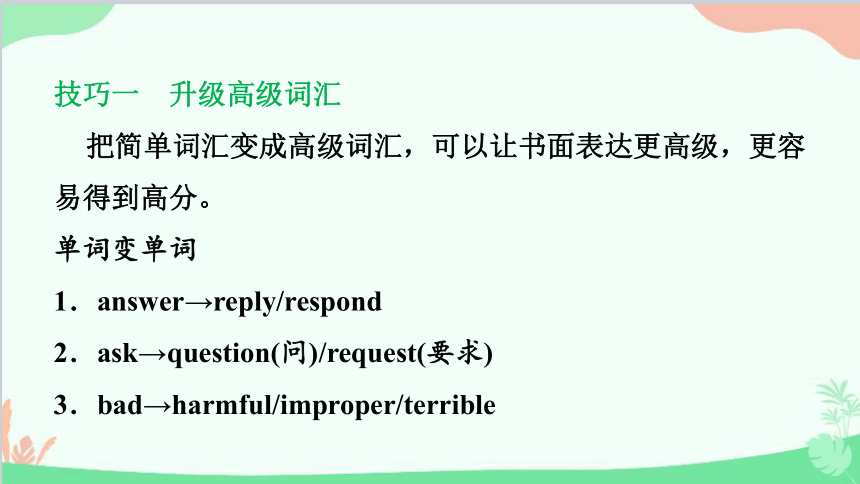
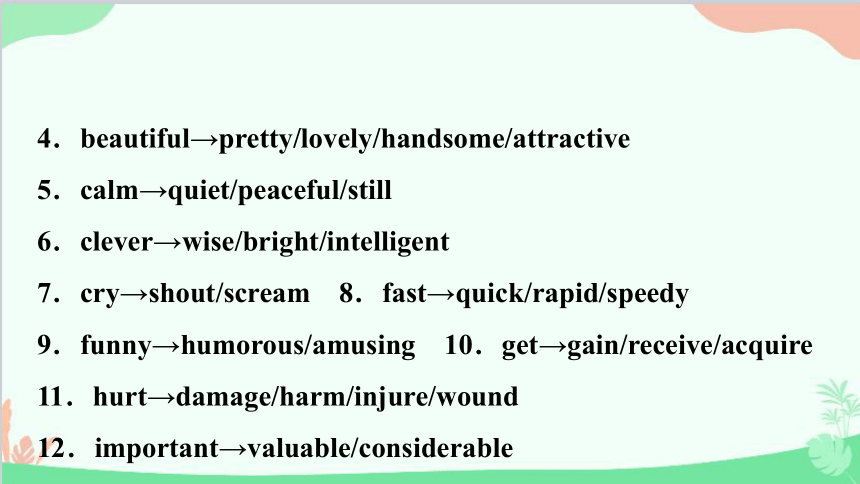
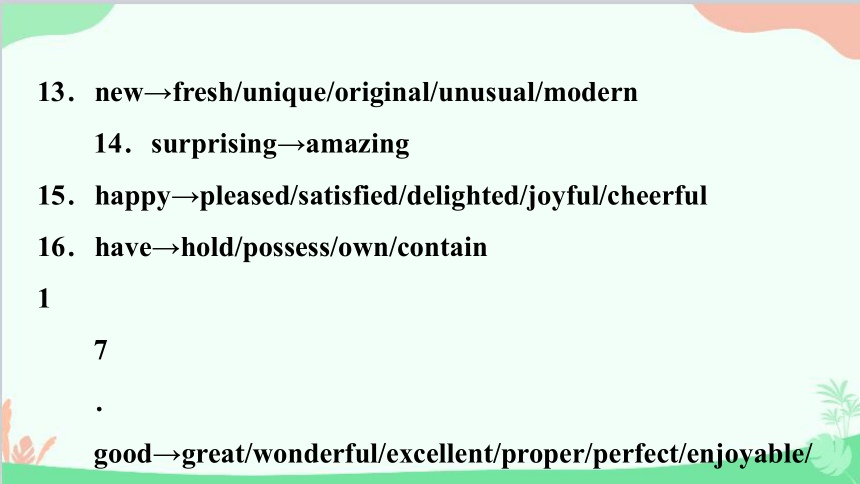
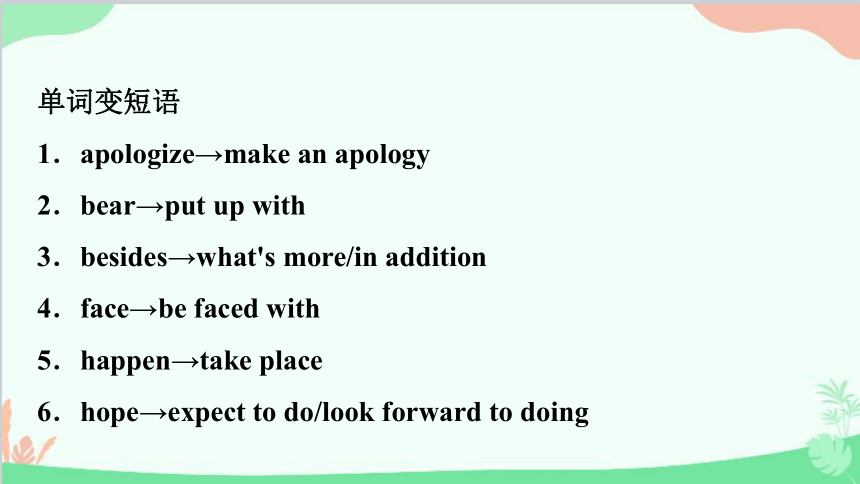
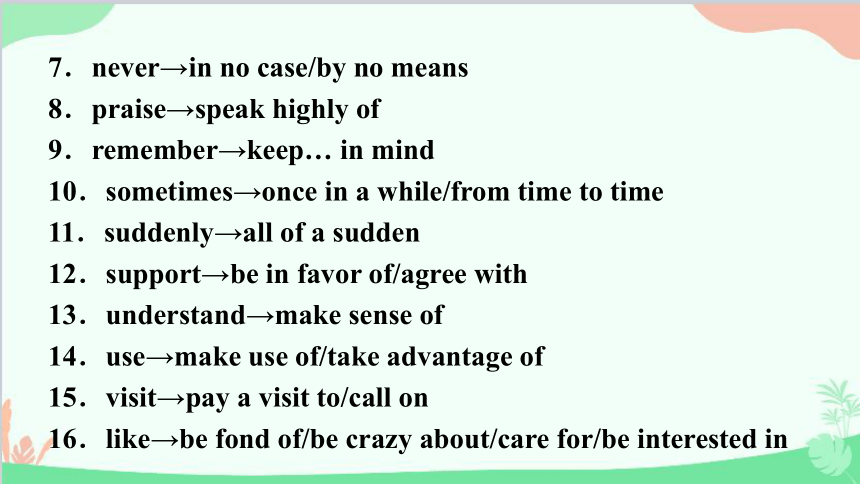
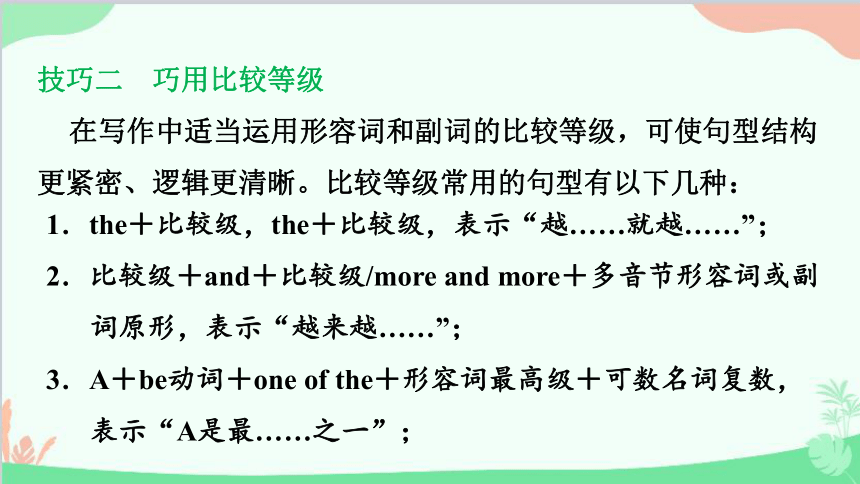
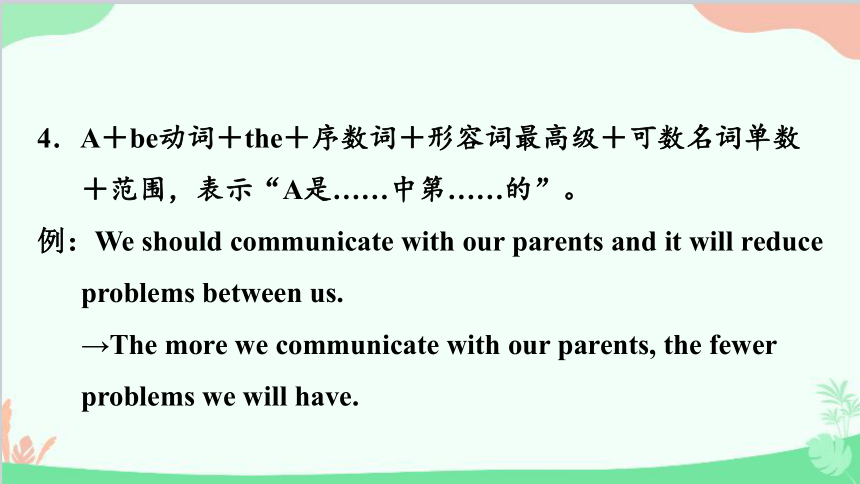
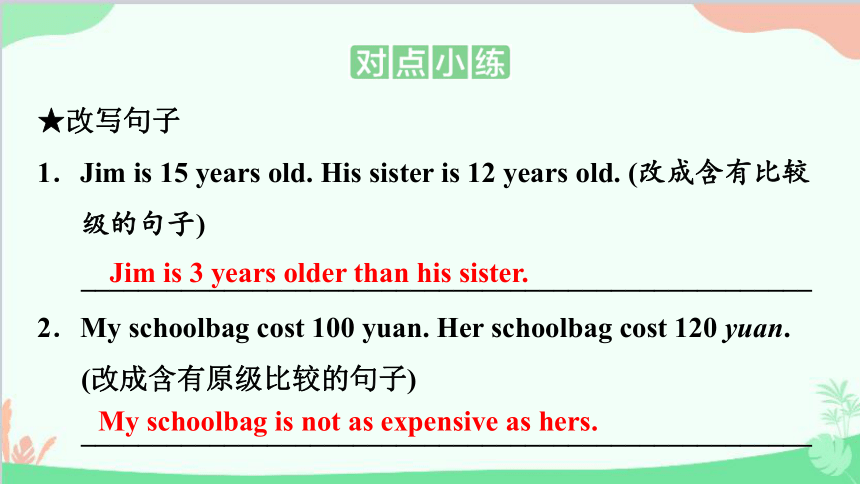
文档简介
(共23张PPT)
第一部分 技巧点拨 多样表达
技巧一 升级高级词汇
把简单词汇变成高级词汇,可以让书面表达更高级,更容易得到高分。
单词变单词
1.answer→reply/respond 2.ask→question(问)/request(要求)
3.bad→harmful/improper/terrible
4.beautiful→pretty/lovely/handsome/attractive
5.calm→quiet/peaceful/still 6.clever→wise/bright/intelligent
7.cry→shout/scream 8.fast→quick/rapid/speedy
9.funny→humorous/amusing 10.get→gain/receive/acquire
11.hurt→damage/harm/injure/wound 12.important→valuable/considerable
13.new→fresh/unique/original/unusual/modern 14.surprising→amazing
15.happy→pleased/satisfied/delighted/joyful/cheerful
16.have→hold/possess/own/contain
17.good→great/wonderful/excellent/proper/perfect/enjoyable/outstanding
18.very→terribly/pretty/greatly/highly/badly/quite/simply/heavily
单词变短语
1.apologize→make an apology
2.bear→put up with
3.besides→what's more/in addition
4.face→be faced with
5.happen→take place
6.hope→expect to do/look forward to doing
7.never→in no case/by no means
8.praise→speak highly of
9.remember→keep… in mind
10.sometimes→once in a while/from time to time
11.suddenly→all of a sudden
12.support→be in favor of/agree with
13.understand→make sense of
14.use→make use of/take advantage of
15.visit→pay a visit to/call on
16.like→be fond of/be crazy about/care for/be interested in
技巧二 巧用比较等级
在写作中适当运用形容词和副词的比较等级,可使句型结构更紧密、逻辑更清晰。比较等级常用的句型有以下几种:
1.the+比较级,the+比较级,表示“越……就越……”;
2.比较级+and+比较级/more and more+多音节形容词或副词原形,表示“越来越……”;
3.A+be动词+one of the+形容词最高级+可数名词复数,表示“A是最……之一”;
4.A+be动词+the+序数词+形容词最高级+可数名词单数+范围,表示“A是……中第……的”。
例:We should communicate with our parents and it will reduce problems between us.
→The more we communicate with our parents, the fewer problems we will have.
★改写句子
1.Jim is 15 years old. His sister is 12 years old. (改成含有比较级的句子)
___________________________________________________
2.My schoolbag cost 100 yuan. Her schoolbag cost 120 yuan. (改成含有原级比较的句子)
___________________________________________________
Jim is 3 years older than his sister.
My schoolbag is not as expensive as hers.
★翻译句子
3.迈克能跑得和大卫一样快。
__________________________________________________
4.在考试中,你越细心,犯的错误就越少。
______________________________________________________________________________________________________
5.汉语是世界上最有用的语言之一。
___________________________________________________
Mike can run as quickly as David.
The more careful you are,the fewer mistakes you will make in the exam.
Chinese is one of the most useful languages in the world.
技巧三 巧用非谓语动词
固定搭配
固定搭配可为作文增分不少,如:had better do sth., in order to do sth., would rather do sth.than do sth.和prefer to do sth.rather than do sth.等。
it作形式主语/宾语
it作形式主语可以避免句子头重脚轻,它代替的是句子的逻辑主语。当不定式(短语)、动名词(短语)或从句在句子中作宾语时,为了保持句子结构平衡,常用it作形式宾语。find, think, consider, make, feel等词后接的宾语是从句或动词不定式时,常用it作形式宾语,真正的宾语(从句/动词不定式)后置。常用的句型如下:
1.It's+形容词(+for/of sb.) to do sth.
做某事(对某人来说)是……的。
2.It's time to do/for/that…是(做)……的时候了。
3.It's one's turn to do sth.轮到某人做某事。
4.It takes(sb.)+一段时间+to do sth.做某事花费(某人)……时间。
5.It seems that…似乎/好像……
例:To obey the law is everyone's duty. →It's everyone's duty to obey the law.
★翻译句子
1.你帮了我那么多,真是太好了。
_________________________________________________
2.我宁愿听轻音乐,也不愿看电视。
__________________________________________________
3.为了使我们的城市更加绿色环保,我们必须种植更多的树。
__________________________________________________
4.我认为学好英语对我们来说很重要。
__________________________________________________
It is nice/kind of you to help me a lot.
I prefer to listen to light music rather than watch TV.
In order to make our city greener, we must plant more trees.
I think it (is) important for us to learn English well.
技巧四 使用特殊句式
感叹句、被动句和倒装句可以起到强调或感叹作用。在写作中,恰当地运用感叹句、被动句和倒装句可以增加文章的可读性。
例:He didn't leave the room until the rain stopped.
→Not until the rain stopped did he leave the room.
★改写句子
1.Jimmy is a clever boy.(改为感叹句)
__________________________________________________
2.The dragon boat is very pretty.(改为感叹句)
__________________________________________________
3.He repaired the old bike last week.(改为被动语态)
__________________________________________________
What a clever boy Jimmy is!
How pretty the dragon boat is!
The old bike was repaired by him last week.
技巧五 适当使用并列句
并列连词可以把两个或两个以上的简单句连接起来,且各个分句之间存在着一定的逻辑关系。常用的并列连词有:and, or, but, so, neither… nor…, either… or…, not only… but also…等。
例: My father likes swimming. My mother likes swimming, too.
→Both my father and my mother like swimming.
★合并句子
1.He spoke slowly. I couldn't understand him.
______________________________________________________________________________________________________
2.He didn't speak slowly. He didn't speak clearly.
___________________________________________________
3.Please hurry up. You will be the last one.
___________________________________________________
He spoke slowly, but I couldn't understand him./Although he spoke slowly, I couldn't understand him.
He spoke neither slowly nor clearly.
Please hurry up, or you will be the last one.
★翻译句子
4.李雷不但学习好,而且与他的同学们相处得也很好。
______________________________________________________________________________________________________
5.我要么周六去那里,要么周日去那里。
___________________________________________________
Li Lei not only studies well but also gets on well with his classmates.
I will go there either on Saturday or on Sunday.
技巧六 展现实力的复合句
宾语从句、状语从句和定语从句更能体现学生的语言素养和能力,使用它们将更容易得到高分。
例:Have you seen the film Titanic Its leading actor is very famous.→Have you seen the film Titanic whose leading actor is very famous
★合并句子
1.A plane is a machine. A plane can fly.
__________________________________________________
2.What did he eat this morning I don't know.
__________________________________________________
A plane is a machine which/that can fly.
I don't know what he ate this morning.
★翻译句子
3.如果你想学好英语,你每天应该花时间练习。
______________________________________________________________________________________________________
4.不努力学习的学生将不会通过考试。
__________________________________________________
5.他悄悄地打开门,这样不会吵醒他的母亲。
_____________________________________________________________________________________________________
If you want to learn English well,you should spend time practicing it every day.
The students who don't study hard will not pass the exam.
He opened the door quietly so that he wouldn't wake his mother up.
谢谢大家!
第一部分 技巧点拨 多样表达
技巧一 升级高级词汇
把简单词汇变成高级词汇,可以让书面表达更高级,更容易得到高分。
单词变单词
1.answer→reply/respond 2.ask→question(问)/request(要求)
3.bad→harmful/improper/terrible
4.beautiful→pretty/lovely/handsome/attractive
5.calm→quiet/peaceful/still 6.clever→wise/bright/intelligent
7.cry→shout/scream 8.fast→quick/rapid/speedy
9.funny→humorous/amusing 10.get→gain/receive/acquire
11.hurt→damage/harm/injure/wound 12.important→valuable/considerable
13.new→fresh/unique/original/unusual/modern 14.surprising→amazing
15.happy→pleased/satisfied/delighted/joyful/cheerful
16.have→hold/possess/own/contain
17.good→great/wonderful/excellent/proper/perfect/enjoyable/outstanding
18.very→terribly/pretty/greatly/highly/badly/quite/simply/heavily
单词变短语
1.apologize→make an apology
2.bear→put up with
3.besides→what's more/in addition
4.face→be faced with
5.happen→take place
6.hope→expect to do/look forward to doing
7.never→in no case/by no means
8.praise→speak highly of
9.remember→keep… in mind
10.sometimes→once in a while/from time to time
11.suddenly→all of a sudden
12.support→be in favor of/agree with
13.understand→make sense of
14.use→make use of/take advantage of
15.visit→pay a visit to/call on
16.like→be fond of/be crazy about/care for/be interested in
技巧二 巧用比较等级
在写作中适当运用形容词和副词的比较等级,可使句型结构更紧密、逻辑更清晰。比较等级常用的句型有以下几种:
1.the+比较级,the+比较级,表示“越……就越……”;
2.比较级+and+比较级/more and more+多音节形容词或副词原形,表示“越来越……”;
3.A+be动词+one of the+形容词最高级+可数名词复数,表示“A是最……之一”;
4.A+be动词+the+序数词+形容词最高级+可数名词单数+范围,表示“A是……中第……的”。
例:We should communicate with our parents and it will reduce problems between us.
→The more we communicate with our parents, the fewer problems we will have.
★改写句子
1.Jim is 15 years old. His sister is 12 years old. (改成含有比较级的句子)
___________________________________________________
2.My schoolbag cost 100 yuan. Her schoolbag cost 120 yuan. (改成含有原级比较的句子)
___________________________________________________
Jim is 3 years older than his sister.
My schoolbag is not as expensive as hers.
★翻译句子
3.迈克能跑得和大卫一样快。
__________________________________________________
4.在考试中,你越细心,犯的错误就越少。
______________________________________________________________________________________________________
5.汉语是世界上最有用的语言之一。
___________________________________________________
Mike can run as quickly as David.
The more careful you are,the fewer mistakes you will make in the exam.
Chinese is one of the most useful languages in the world.
技巧三 巧用非谓语动词
固定搭配
固定搭配可为作文增分不少,如:had better do sth., in order to do sth., would rather do sth.than do sth.和prefer to do sth.rather than do sth.等。
it作形式主语/宾语
it作形式主语可以避免句子头重脚轻,它代替的是句子的逻辑主语。当不定式(短语)、动名词(短语)或从句在句子中作宾语时,为了保持句子结构平衡,常用it作形式宾语。find, think, consider, make, feel等词后接的宾语是从句或动词不定式时,常用it作形式宾语,真正的宾语(从句/动词不定式)后置。常用的句型如下:
1.It's+形容词(+for/of sb.) to do sth.
做某事(对某人来说)是……的。
2.It's time to do/for/that…是(做)……的时候了。
3.It's one's turn to do sth.轮到某人做某事。
4.It takes(sb.)+一段时间+to do sth.做某事花费(某人)……时间。
5.It seems that…似乎/好像……
例:To obey the law is everyone's duty. →It's everyone's duty to obey the law.
★翻译句子
1.你帮了我那么多,真是太好了。
_________________________________________________
2.我宁愿听轻音乐,也不愿看电视。
__________________________________________________
3.为了使我们的城市更加绿色环保,我们必须种植更多的树。
__________________________________________________
4.我认为学好英语对我们来说很重要。
__________________________________________________
It is nice/kind of you to help me a lot.
I prefer to listen to light music rather than watch TV.
In order to make our city greener, we must plant more trees.
I think it (is) important for us to learn English well.
技巧四 使用特殊句式
感叹句、被动句和倒装句可以起到强调或感叹作用。在写作中,恰当地运用感叹句、被动句和倒装句可以增加文章的可读性。
例:He didn't leave the room until the rain stopped.
→Not until the rain stopped did he leave the room.
★改写句子
1.Jimmy is a clever boy.(改为感叹句)
__________________________________________________
2.The dragon boat is very pretty.(改为感叹句)
__________________________________________________
3.He repaired the old bike last week.(改为被动语态)
__________________________________________________
What a clever boy Jimmy is!
How pretty the dragon boat is!
The old bike was repaired by him last week.
技巧五 适当使用并列句
并列连词可以把两个或两个以上的简单句连接起来,且各个分句之间存在着一定的逻辑关系。常用的并列连词有:and, or, but, so, neither… nor…, either… or…, not only… but also…等。
例: My father likes swimming. My mother likes swimming, too.
→Both my father and my mother like swimming.
★合并句子
1.He spoke slowly. I couldn't understand him.
______________________________________________________________________________________________________
2.He didn't speak slowly. He didn't speak clearly.
___________________________________________________
3.Please hurry up. You will be the last one.
___________________________________________________
He spoke slowly, but I couldn't understand him./Although he spoke slowly, I couldn't understand him.
He spoke neither slowly nor clearly.
Please hurry up, or you will be the last one.
★翻译句子
4.李雷不但学习好,而且与他的同学们相处得也很好。
______________________________________________________________________________________________________
5.我要么周六去那里,要么周日去那里。
___________________________________________________
Li Lei not only studies well but also gets on well with his classmates.
I will go there either on Saturday or on Sunday.
技巧六 展现实力的复合句
宾语从句、状语从句和定语从句更能体现学生的语言素养和能力,使用它们将更容易得到高分。
例:Have you seen the film Titanic Its leading actor is very famous.→Have you seen the film Titanic whose leading actor is very famous
★合并句子
1.A plane is a machine. A plane can fly.
__________________________________________________
2.What did he eat this morning I don't know.
__________________________________________________
A plane is a machine which/that can fly.
I don't know what he ate this morning.
★翻译句子
3.如果你想学好英语,你每天应该花时间练习。
______________________________________________________________________________________________________
4.不努力学习的学生将不会通过考试。
__________________________________________________
5.他悄悄地打开门,这样不会吵醒他的母亲。
_____________________________________________________________________________________________________
If you want to learn English well,you should spend time practicing it every day.
The students who don't study hard will not pass the exam.
He opened the door quietly so that he wouldn't wake his mother up.
谢谢大家!
同课章节目录
- 词法
- 名词
- 动词和动词短语
- 动词语态
- 动词时态
- 助动词和情态动词
- 非谓语动词
- 冠词
- 代词
- 数词和量词
- 形容词副词及其比较等级
- 介词和介词短语
- 连词和感叹词
- 构词法
- 相似、相近词比较
- 句法
- 陈述句
- 一般疑问句和否定疑问句
- 特殊疑问句及选择疑问句
- 反意疑问句
- 存在句(There be句型)
- 宾语从句
- 定语从句
- 状语从句
- 主谓一致问题
- 简单句
- 并列句
- 复合句
- 主谓一致
- 主、表语从句
- 名词性从句
- 直接引语和间接引语
- 虚拟语气
- 感叹句
- 强调句
- 倒装句
- 祈使句
- 句子的成分
- 句子的分类
- 题型专区
- 单项选择部分
- 易错题
- 完形填空
- 阅读理解
- 词汇练习
- 听说训练
- 句型转换
- 补全对话
- 短文改错
- 翻译
- 书面表达
- 任务型阅读
- 语法填空
- 其他资料
